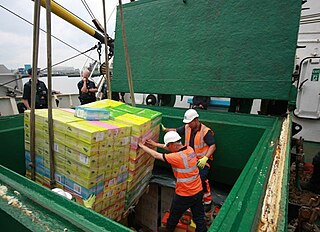
Smuggling is the illegal transportation of objects, substances, information or people, such as out of a house or buildings, into a prison, or across an international border, in violation of applicable laws or other regulations. More broadly, social scientists define smuggling as the purposeful movement across a border in contravention to the relevant legal frameworks.

Customs is an authority or agency in a country responsible for collecting tariffs and for controlling the flow of goods, including animals, transports, personal effects, and hazardous items, into and out of a country. Traditionally, customs has been considered as the fiscal subject that charges customs duties and other taxes on import and export. In recent decades, the views on the functions of customs have considerably expanded and now covers three basic issues: taxation, security, and trade facilitation.
The Canada Revenue Agency is the revenue service of the Canadian federal government, and most provincial and territorial governments. The CRA collects taxes, administers tax law and policy, and delivers benefit programs and tax credits. Legislation administered by the CRA includes the Income Tax Act, parts of the Excise Tax Act, and parts of laws relating to the Canada Pension Plan, employment insurance (EI), tariffs and duties. The agency also oversees the registration of charities in Canada, and enforces much of the country's tax laws.
Excise tax in the United States is an indirect tax on listed items. Excise taxes can be and are made by federal, state and local governments and are not uniform throughout the United States. Certain goods, such as gasoline, diesel fuel, alcohol, and tobacco products, are taxed by multiple governments simultaneously. Some excise taxes are collected from the producer or retailer and not paid directly by the consumer, and as such often remain "hidden" in the price of a product or service, rather than being listed separately.

The United States Customs Service was the very first federal law enforcement agency of the U.S. federal government. Established on July 31, 1789, it collected import tariffs, performed other selected border security duties, as well as conducted criminal investigations.

The Canada Border Services Agency is a federal law enforcement agency that is responsible for border guard, immigration enforcement, and customs services in Canada.
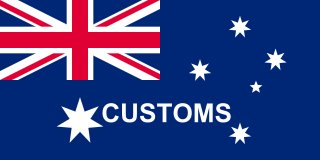
The Australian Customs and Border Protection Service was an Australian federal government agency responsible for managing the security and integrity of the Australian border and facilitating the movement of legitimate international travelers and goods, whilst protecting the safety, security and commercial interests of Australians. It was headquartered in Canberra and employed over 5,800 people around Australia and overseas.

The Federal Ministry of Finance, abbreviated BMF, is the cabinet-level finance ministry of Germany, with its seat at the Detlev-Rohwedder-Haus in Berlin and a secondary office in Bonn. The current Federal Minister of Finance is Christian Lindner (FDP).

The Customs and Excise Department (C&ED) is a government agency responsible for the protection of the Hong Kong Special Administrative Region against smuggling; the protection and collection of revenue on dutiable goods on behalf of the Hong Kong Government; the detection and deterrence of drug trafficking and abuse of controlled drugs; the protection of intellectual property rights; the protection of consumer interests; and the protection and facilitation of legitimate trade and upholding Hong Kong's trading integrity.

The New Zealand Customs Service is a state sector organisation in New Zealand whose role is to provide border control and protect the community from potential risks arising from international trade and travel, as well as collecting duties and taxes on imports to the country.

In Singapore, law enforcement is principally led by the Singapore Police Force (SPF), and supported by other agencies including the Singapore Prison Service, Central Narcotics Bureau, Corrupt Practices Investigation Bureau, Internal Security Department, Immigration and Checkpoints Authority, and Singapore Customs. Furthermore, some law enforcement powers may be exercised by non-government entities such as auxiliary police forces and security officers.

A border guard of a country is a national security agency that performs border security. Some of the national border guard agencies also perform coast guard and rescue service duties.

Law enforcement in Germany is constitutionally vested solely with the states, which is one of the main features of the German political system.

The Treasury of the Isle of Man is the finance department of the Isle of Man Government. It prepares the annual budget for the Government, and also handles taxation, customs and excise, economic affairs, information systems, internal audit, currency and the census in the Isle of Man.

An excise, or excise tax, is any duty on manufactured goods that is levied at the moment of manufacture rather than at sale. Excises are often associated with customs duties, which are levied on pre-existing goods when they cross a designated border in a specific direction; customs are levied on goods that become taxable items at the border, while excise is levied on goods that came into existence inland.
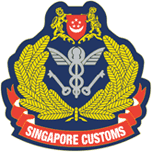
The Singapore Customs is a government agency under the Ministry of Finance of the Government of Singapore. Singapore Customs was reconstituted on 1 April 2003, after the Customs and Excise Department and the Trade Facilitation Division and Statistics Audit Unit of International Enterprise Singapore were merged. The border function's at the land, air and sea checkpoints were also simultaneously transferred to Immigration and Checkpoints Authority (ICA). Singapore Customs became the lead agency on trade facilitation and revenue enforcement matters. It is also responsible for the implementation of customs and trade enforcement measures including those related to Free Trade Agreements and strategic goods.

The Royal Malaysian Customs Department is a government department body under the Malaysian Ministry of Finance. RMCD functions as the country's main indirect tax collector, facilitating trade and enforcing laws. The top management of JKDM is led by the Director General of Customs and assisted by 3 deputies, namely, the Deputy Director General of Customs Enforcement/Compliance Division, the Deputy Director General of Customs Customs/Inland Tax Division and the Deputy Chief Director of Customs Management Division. The Royal Malaysian Customs Department consists of several divisions, namely the Enforcement Division, the Inland Tax Division, the Compliance Division, the Customs Division, and the Technical Services Division.
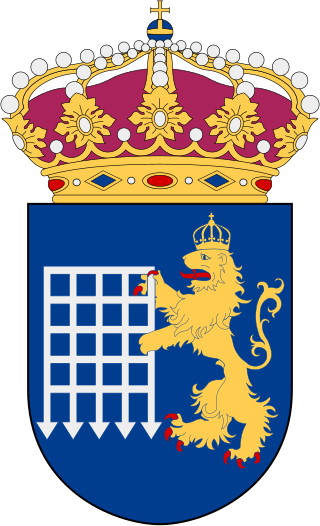
The Swedish Customs is the customs service of the Kingdom of Sweden. It is a department of the Government of Sweden. It is one of the oldest governmental agencies in Sweden, as it was founded in 1636. It is also Sweden's de facto border guard.

The illicit cigarette trade is defined as “the production, import, export, purchase, sale, or possession of tobacco goods which fail to comply with legislation”. Illicit cigarette trade activities fall under 3 categories:
- Contraband: cigarettes smuggled from abroad without domestic duty paid;
- Counterfeit: cigarettes manufactured without authorization of the rightful owners, with intent to deceive consumers and to avoid paying duty;
- Illicit whites: brands manufactured legitimately in one country, but smuggled and sold in another without duties being paid.
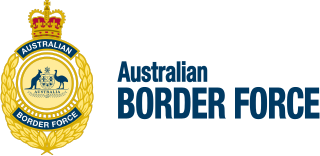
The Australian Border Force (ABF) is a federal law enforcement agency, part of the Department of Home Affairs, responsible for offshore and onshore border enforcement, investigations, compliance and detention operations in Australia. Through the ABFs Marine Unit, the ABF performs Coast Guard and marine law enforcement duties and is a component of the Maritime Border Command. The ABF is also part of the National Intelligence Community and is an active member of the World Customs Organization.





















